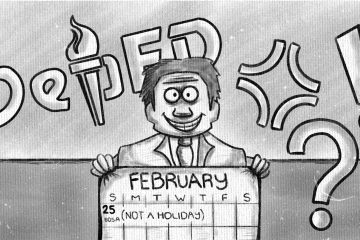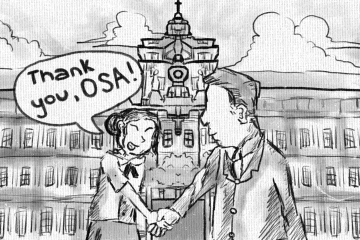 THE TRAIN stops at my station and I move along with the crowd that walked like zombies. But I forgive them; it was a long day after all. The streets around Tayuman station is always busy even at night. Vendors who sell goods are littering the streets, and stores are open, welcoming people in. It is a long walk on the way to the jeepney station that I’m supposed to ride to our apartment, but this is the norm so I’m used to it.
THE TRAIN stops at my station and I move along with the crowd that walked like zombies. But I forgive them; it was a long day after all. The streets around Tayuman station is always busy even at night. Vendors who sell goods are littering the streets, and stores are open, welcoming people in. It is a long walk on the way to the jeepney station that I’m supposed to ride to our apartment, but this is the norm so I’m used to it.
But nothing is supposed to be normal that night. It was unnerving to see the business going as usual. It was unnerving to see people walking as if nothing happened. It was frightening to see that everything was normal when just last night, a man was shot dead in front of a gasoline station near the jeepneys I’m supposed to ride home. His blood that pooled around his body probably left a stain, but it was already cleaned when I got there.
The headlines that I read always say the same thing: somebody was killed by two armed men riding on motorcycles. A taxi driver points to me a place and says, “Diyan binaril ‘yung lalaki kagabi, e. May drugs daw.”
I can now name several places where people have died.
The list of the dead is now a mountain that grows day by day. Innocent lives are at stake, and if the bullet got them, they are labelled as “collateral damage” or “separate case.” But in the end, they will remain the same as those who are targeted and killed in this bloody war—a mere statistic.
We have entered the times when missing people are found in funeral parlors, where unanswered texts and calls may mean something else other than just being busy or the phone has no load or a dead battery, where the blood of the powerless paints the streets.
There is another dark side of this issue that we should also put in the spotlight. The current issue is lacking discourse, mainly because we avoid talking about it. We avert our eyes; we take another route. We do not talk about it enough and we are just letting it happen. We are letting them kill our countrymen.
It is so easy for other people to condemn said drug addicts to death. The words “Mamatay na ‘yan, adik naman ‘yan e,” falls out of their mouth so carelessly, without even weighing the consequences of those words. It is so easy, even for the President, to say that somebody deserves to be killed because it is not his hands that will pull the trigger.
But do they really know what they mean to say? Do they really mean it? Do they know that it is an actual life they are trying to end with their words?
It just goes to show that some people only care when a certain issue affects them personally. We only start to care if it is someone we know. We only start to talk about it if it happens to us or someone whom we care about. We do not have to be related to these people to care about them.
We should care because our fellowmen—no matter who they are—are dying because we allow it. Surely, there is another way to solve the drug menace without taking lives.
The killings in the drug war that is currently happening in our country is a sensitive issue that needs proper discourse. And with proper discourse, with the use of critical thinking—not biased opinions that you got from a troll on the internet—we can form solutions that can help lessen the country’s drug problem. We cannot just leave it to those who are protesting in the streets or in social media or wherever. We cannot let injustice prevail. Add into the voice because the cries are not heard enough, but make sure your voice counts. Make sure it is not just another noise. F
For feedback, email kthlngrrr.theflame@gmail.com.



